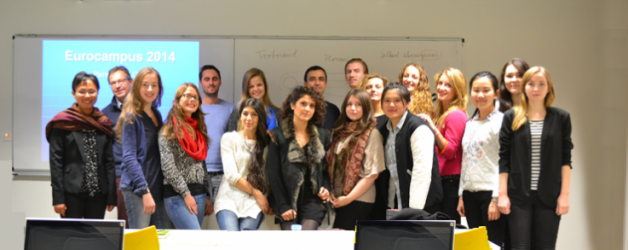“September 8th 2014. After commuting for nearly an hour in the utterly crowded Parisian metro – amazing how quickly my romantic view of Parisian Art-Nouveau metro’s can change -, I managed to reach my French university. It was the first day of the exchange programme for my master ‘Intercultural Communication’, and I couldn’t wait to start this new adventure.”
International classroom
My subjects were taught in ‘international classrooms’, they included students from a range of nationalities and cultures who meet and learn in English from professors who, in the majority of cases, were not native English speakers. My classmates and professor came from all over the world. On a regular day I had conversations and discussions with students from Madagascar, the United States of America, Ukraine and Albania.
Influence of stereotypes
Whilst being sensitive for cultural differences, I couldn’t help but test the stereotypes I had about these students from different countries. I expected the German students to be lined up in class before everyone else arrived, the Chinese students to be equipped with the latest high-tech devices, and the Americans to be… just loud?
At a certain point I noticed that these stereotypes were influencing my selection for group work partners. I preferred to work with my German or Dutch classmates, because we shared the same values, such as punctuality and precision. I tried not to sit close to students I didn’t want to work with and I even closed the deal for partnering days before the deadline.
Suddenly it hit me. Here I was, studying intercultural communication but hesitant to work with non-Dutch classmates. I was afraid the cultural differences would create problems and minimize my chances on high grades. After all, when working with people from your own culture there is no need to negotiate the working style or the mode of communication, cooperation is easier and time efficient.

Internationalisation of the mind.
Little did I know that negotiating these ‘self-evident truths’ are actually insightful. My non-Dutch classmates came up with new methods and ways of working that only enriched my knowledge. By stepping out of my comfort zone and work with people from different cultural backgrounds, I opened up and managed to experience an ‘internationalisation of the mind’. I didn’t just gain knowledge on other cultures, but I developed intercultural sensitivity and an international attitude.
So what did studying in an international classroom bring me? Nowadays, when I have a job interview, I tell my future boss with great confidence that I am able to work effectively in settings of social and cultural diversity. By studying in an international classroom, I developed the ability to think globally and consider issues from a variety of perspectives. These are great and important soft skills for employers. Studying in an international classroom hasn’t only increased my personal development, but also has a positive impact on my (future) career.
Babet Agten
The CareerProfessor.works Team
© 2017 CareerProfessor.works. All Rights Reserved.






